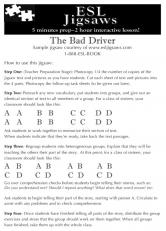ESL Jigsaws
5 Minutes Prep - 2 Hour Interactive Lesson!
Should Death Be a Topic in Your ESL Class?
As Veterans Day and Remembrance Day approach, it’s the time of year when we often think about those who have passed away. Should death be a topic in the ESL/EFL classroom? There is no question the topic has to be approached with sensitivity. We don’t know when a loss in the family may be recent for some students. While talking about death can trigger sad feelings, the far less controversial topics of Mother’s Day and Father’s Day are often as loaded for some and must be approached with equal sensitivity.
Imagine living in a foreign language country and being told by someone that her husband just passed away. Knowing how to talk about death or to react to news of a death with sensitivity is an important soft skill students know they need. Students busily take notes when you teach words like “grieve”, euphemisms like “pass away” and ways of responding, such as “I’m so sorry for your loss”.
My jigsaw “The Widow”, in Callan’s Contemporary Jigsaws (1 & 2) is meant for this area of language instruction and works well around Veterans and Remembrance Day or another time of year. It’s actually the only slightly altered story of my great aunt, Lily, whose husband died during the war, just after they were married. As with many people of her generation, my aunt never remarried. Students often share during the discussion that follows the jigsaw that this was common with the grandparents’ or great grandparents' generation in their countries of origin as well. This leads to a broader discussion of societal changes between the generations. Add to that the vocabulary in the story, like ‘funeral service” and “cemetery” and “pay your respects” and you have a three-hour lesson that will keep students engaged. Email and let me know how it goes!
Post your comment
Comments
No one has commented on this page yet.
RSS feed for comments on this page | RSS feed for all comments


